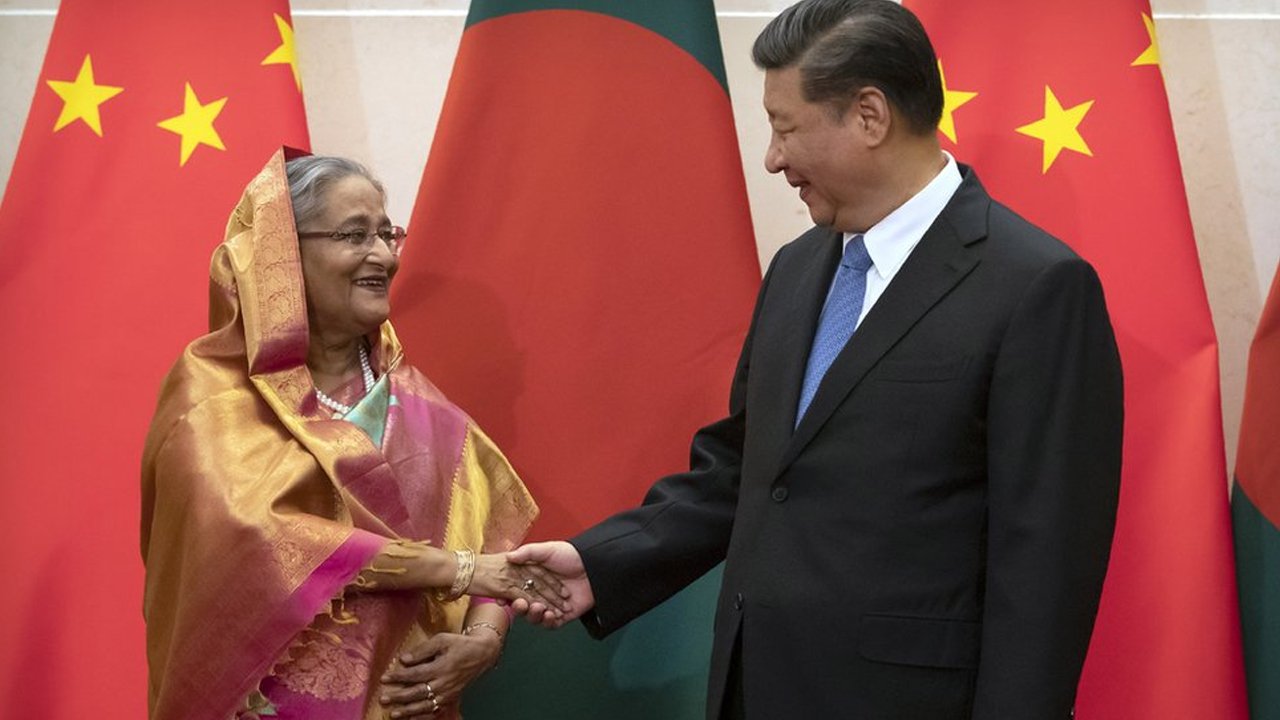Former Bangladesh Prime Minister Sheikh Hasina, who is seeking refuge in India after violent protests in the country, has claimed that her downfall has been orchestrated by the US as she refused to surrender the sovereignty of a tiny island in the Bay of Bengal.
For some years, rumors have been rife that Washington has been eyeing St. Martin Island, a small island of three kilometers square in the northeastern part of the Bay of Bengal. It is about nine kilometers south of the tip of the Cox’s Bazar-Teknaf peninsula and forms the southernmost part of Bangladesh.
The Bay of Bengal lies on top of the sea lanes of communication that connect China, Japan, and Korea with the Middle East and Africa. Half of the world’s trade passes through these lanes. The region is essential for the US policy of a ‘Free, open and inclusive Indo-Pacific,’ a euphemism for checking China’s assertiveness.
In a statement issued to the Economic Times, the former Bangladesh prime minister said: “I could have remained in power if I had surrendered the sovereignty of Saint Martin Island and allowed America to hold sway over the Bay of Bengal.”
The Bay of Bengal is the largest in the world, ensconced between India on the East and Indonesia on the West. Bangladesh, Sri Lanka, and Myanmar are littoral countries. The region’s economic, diplomatic, and security importance attracts major powers in the East and the West (China, Japan, India, the US, and even Russia).
The Sheikh Hasina government had been at loggerheads with the US, which made the South Asian country the focal point of its promoting democracy agenda. In December 2021, Washington sanctioned Bangladesh’s elite security force, the Rapid Action Battalion (RAB), over alleged extrajudicial killings and other human rights violations. The US insistence on making an example out of Bangladesh has been straining the ties between the two countries and pushing the country closer to Russia and China.
Earlier this year, Sheikh Hasina, the four-time Prime Minister of Bangladesh, disclosed to the 14-party alliance that Western countries offered her a hassle-free re-election in the 7 January polls provided she allowed a foreign country to establish an air base in Bangladesh territory. Hasina did not name the US.
About the proposal for the airbase, the premier had said, “The offer came from a white man. It may be aimed at only one country, but it is not. I know where else they intend to go. There will be more trouble. But don’t worry about it. “If I allowed a certain country to build an airbase in Bangladesh, then I would have had no problem.”
During a parliamentary discussion on June 14, 2023, Rashed Khan Menon, president of the Workers Party of Bangladesh, alleged that the United States is after Saint Martin’s Island and that the new US visa policy is part of a strategy for “regime change.” In September, US Secretary of State Antony Blinken announced a policy that reserves the right to deny visas to individuals in Bangladesh who will hinder free and fair elections in the country in January 2024.
Rumors about the US coveting St. Martin Island date back to 2003. Then-US Ambassador Mary Ann Peters ruled out media speculation that Washington was desperate to lease a military base from Dhaka to station its forces somewhere between the Far and Middle East(s).
“The United States has no plans, no requirement, and no desire for a military base on St. Martin’s Island, Chittagong, or anywhere else in Bangladesh,” she said on July 2, 2003, while addressing a seminar titled ‘Security of South Asia: A US Perspective’ at the Bangladesh Institute of International and Strategic Studies (BIISS).

St. Martin & Quest To Dominate Bay Of Bengal
Saint Martin Island is also known as Narikel Jinjira (Coconut Island) or Daruchini Dwip (Cinnamon Island). Although the island is under Bangladesh’s jurisdiction, it is only eight kilometers from the Myanmar coast.
On the North of the island is mainland Bangladesh, and on the south and the west is the vast expanse of the Bay of Bengal. The island is around nine kilometers away from Teknaf, a subdistrict in Cox’s Bazar District.
In 2023, Sheikh Hasina unveiled the country’s first submarine base, BNS Sheikh Hasina, in Cox’s Bazar. The ‘state-of-the-art’ base was constructed with China’s help under a contract signed in September 2019. The facility can berth six submarines and eight naval vessels simultaneously.
With the country having two submarines of its own, Bangladesh’s PM said that besides helping the country protect its maritime assets, the base would benefit the “vessels traversing the Bay of Bengal.” This means that a Chinese submarine can also dock at the base in the future. Saint Martin Island can give eyes and ears to the US on the Chinese activities in the region.
The Bay of Bengal, nestled between India, Myanmar, and Bangladesh, is located at one of the world’s most important strategic chokepoints: the Strait of Malacca, which connects the Indian Ocean with the South China Sea. Hence, a military base in the Bay of Bengal would give the US a stronghold over these chokepoints.
China is aware of its limited and unfavorable maritime geography and has long sought access to the Bay of Bengal. Myanmar and Bangladesh have considerably facilitated China’s entry into the BoB, which might now change after Hasina’s exit. India would be happy with the possible Chinese exit and circumspect about US military presence in its backyard.
- Ritu Sharma has been a journalist for over a decade, writing on defense, foreign affairs, and nuclear technology.
- The author can be reached at ritu.sharma (at) mail.com
- Follow EurAsian Times on Google News




